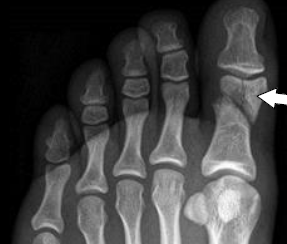Injured/ fractured great toe
An injured great toe is a common injury, usually caused by dropping a heavy object on the foot or stubbing the toe against something hard. You may be provided with support for your foot in the form of a removable Velcro fastening shoe. Alternatively, you may be able to wear your own supportive closed toe shoes. You will be able to walk on your foot as the pain allows. You will gradually be able to stop wearing your supportive footwear as the pain reduces or otherwise instructed by the doctor treating you.

Injured toes are extremely painful and can sometimes be swollen red and bruised. The pain will be worse in the first few weeks but you may expect some discomfort for longer, as it can take four to six weeks to heal if there is a fracture.
- You should take pain killers regularly to keep pain levels under control.
- You should use ice, wrapped in a tea towel, and elevation to help bring swelling down.
- You should wear the supportive footwear for as long as recommended.
- You should weight bear as the pain allows in your supportive footwear.
- You should not take part in any physical/ contact sports which may put you at risk of further injury; the time frame for this will be outlined at the point of assessment.
- You should not drive whilst wearing the walking boot as you will void your insurance should you have an accident.
Follow-up
A follow-up will be arranged, based on the severity of your injury; this will be determined by the practitioner or doctor assessing you. You may be referred to the multi-professional fracture clinic to have your x-ray reviewed by an orthopaedic consultant.
If your condition is not improving, or if your pain relief is not adequate, please contact your GP. If your condition is worsening, please contact the multi-professional fracture clinic on 01223 348299 or 01223 257095.
We are smoke-free
Smoking is not allowed anywhere on the hospital campus. For advice and support in quitting, contact your GP or the free NHS stop smoking helpline on 0800 169 0 169.
Other formats
Help accessing this information in other formats is available. To find out more about the services we provide, please visit our patient information help page (see link below) or telephone 01223 256998. www.cuh.nhs.uk/contact-us/accessible-information/
Contact us
Cambridge University Hospitals
NHS Foundation Trust
Hills Road, Cambridge
CB2 0QQ
Telephone +44 (0)1223 245151
https://www.cuh.nhs.uk/contact-us/contact-enquiries/

